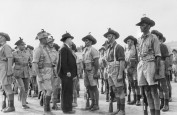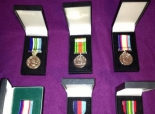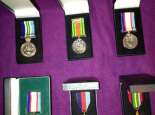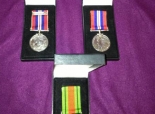War Service
Aboriginal Australians fought in the second Boer War (1899 – 1902) through two World Wars and in the Vietnam War, right up to today. Until recently, we have been largely ignored, our cultural identity unrecognised in formal war records.

Minister for the Army, the Honorable Frank Forde, greeting Corporal Latham during a visit to the Western Training Centre, Northam, W.A. 2/4/1943. Courtesy Australian War Memorial, http://www.awm.gov.au/collection/051013/
First World War
Though Aboriginal people could not vote, as we were not Australian citizens and were not counted in the census, over 400 of us fought in the First World War. Men volunteered to fight and women joined as nurses and aides. At home, we lived on the margins of European society and were treated as inferior. Yet, when we joined up to fight, we were treated as equals. Aboriginal men were paid the same as other soldiers and generally, we were accepted without prejudice.
When war broke out in 1914, many Aboriginal people who tried to enlist were rejected on the grounds of race. Many Noongars joined as Maoris or Indians because of a ban on recruiting Aboriginals. At other times, Noongar people would claim they did not know who their parents were to avoid questions about their identity. Sometimes the fact that a man was Noongar was ignored altogether (as the examples below show) and he simply enlisted as a soldier of ‘dark complexion,’ no questions asked.[i] For this reason, it is very difficult to get exact numbers of Noongar people who served in war times.
Second World War
More than 5,000 Aboriginal people Australia-wide served in World War Two. Generally, Noongar people served in ordinary units with the same conditions of service as European servicemen. Many Aboriginal soldiers experienced equal treatment – we were ‘amongst mates’ for the first time in our lives. However, upon return to civilian life, we were often treated with the same prejudice and discrimination as before.
This letter to the Western Mail newspaper in 1941 shows one incident where a good soldier was removed from Blackboy Hill Camp for being Noongar.
‘Non-Native’
Noongar people who had served in the army or navy for longer than six months were under Aboriginal legislation and automatically regarded as ‘non-native’ and were entitled to be ‘non-native’. It clearly stated in the Native Administration Act 1954 (W.A.) that ‘Natives of the full or less blood who have served in New Guinea or outside the Commonwealth or have for at least six months served in the Commonwealth as a member of the armed forces and have received or are entitled to receive an honorable discharge, are deemed to be no longer a native for purposes of the Act.’ [ii]
Yet, Noongar returned servicemen did not receive any privileges or benefits that a ‘non-native’ status would give us. Historian, T. Hunter points out: ‘However, the Western Australian State Electoral Office would not differentiate Indigenous servicemen and ex-servicemen from other Indigenous people and refused them the franchise unless they also held a Certificate of Citizenship.’ This misuse of legislation on behalf of the Western Australian bureaucrats was not detected until 1961.[iii]
Further Insult
A further gross insult was given to the returning Noongar soldiers. They were not eligible for the land settlement grants ‘soldier settlement scheme’ offered to other servicemen, as Noongars were not considered citizens. With the exception of ANZAC Day, many Noongar people were barred from Returned and Services League clubs. We were not given the right to vote for another 17 years, when in 1967, The Referendum gave us that right. Since then, Aboriginal people have served in all conflicts in which Australia has participated.
Aboriginal, including Noongar people’s involvement in International Wars and Conflicts [iv]
| 1899-1902 Transvaal, South Africa | Second Boer War |
| 1914-1918 mainly Europe | World War I ( The Great War) |
| 1939-1945 Europe | World War II |
| 1946-1951 Japan | Occupation of Japan by Allied forces |
| 1950-1953 Japan Korea | Japan Korean War |
| 1950-1960 Korea | Korean War |
| 1963-1966 | Indonesia-Malaysia confrontation |
| 1962-1975 | Vietnam War |
| 1990-1991 Iraq | Gulf War |
| 2001 to present | Afghanistan War – Terrorism |
| 2003-2011 | Second Gulf War – Iraq |
Aboriginal Memorial, East Victoria Park (WA)
An RSL Aboriginal memorial can be found on Fred Bell Parade in East Victoria Park, near Perth. It consists of a black granite rock with a memorial nameplate and a flagpole flying the Aboriginal flag.
In memory of the Aboriginal service men and women of the Victoria Park District who served their country in its hours of need. In doing so they helped to build a Nation. Dedicated 3rd February, 2002.
RSL Aboriginal memorial
Noongar in the First and Second World Wars
Kevin Fitzgerald (SWALSC staff member) has a history of family members who served in two world wars. Kevin’s great uncle, John Fitzgerald 1889-1936, fought in France in World War I. He received the British War Medal (21258) and the Victory Medal (20175). Yet, John Fitzgerald returned to Australia as a non-citizen, not a hero, like his fellow European soldiers.
Cecil and Raymond Fitzgerald, Kevin’s uncles, fought in World War II. Cecil Fitzgerald joined the Australian Imperial Forces in 1940 and was then posted to Palestine. He served in the 2/32 battalion (9th Division) where he fought in the battle of Tobruk and was badly injured.
The Fitzgerald brothers were Noongar men who joined the army and were counted as equal contributors to the war effort. In John’s case, he applied as a ‘natural born British subject,’ albeit with ‘dark’ complexion.[v] Raymond served with his platoon like his compatriots but when he returned to Perth he was refused entry to a hotel on account of being Aboriginal. The whole platoon, incensed at the treatment, left en masse and went to a pub in Rivervale where he was welcome.[vi]
John Fitzgerald died in 1936 and was buried in an unmarked grave in York, unacknowledged until recently.[vii] Cecil and Raymond Fitzgerald also died unacknowledged as Australian war heroes.
These war medals belong to John, Cecil and Raymond Fitzgerald who service in World War I and World War II.
Brendan Moore’s (former SWALSC staff member) great grandfather Leopold Augustus Websdale 1897-1969, fought in France during World War 1, and enlisted in the Australian Army in 1942 during World War II. He received the British War Medal (21875) and Victory Medal (20677). Leo enlisted as having dark complexion, dark eyes and brown hair; since joining as a Noongar would have meant his application would have been rejected on account of race. Upon returning to Australia, Leo received little acknowledgement for his service and missed out on privileges most other returned European soldiers had earned.
Martha Borinelli
The late Martha Borinelli talks about her father’s part in the Second World War. How he was taken to north Western Australia to patrol the coast. She recalls how the army trucks came to collect all the Noongars in the Miling – Moora area and take them to missions for protection from the Japanese. Martha talks also of the treatment of returned Noongar servicemen, how they weren’t entitled to land, or even a drink, like European soldiers, were.
Honouring Indigenous War Graves Inc.
In 2005, Vietnam veteran John Schnaars set up Honouring Indigenous War Graves Inc to redress the painful omission of returned Indigenous soldiers. This organization has since enabled recognition of 60 headstones that have been placed on Indigenous graves in towns throughout Western Australia. The ceremonies included families and friends of the old soldiers, as well as Army personnel and various dignitaries.
Cecil and Raymond Fitzgerald were honoured in November 2008 at Karrakatta cemetery. John Fitzgerald was honoured in a ceremony at the York cemetery on December 21, 2008. Around 150 people attended, with a Welcome to Country ceremony spoken in Noongar language by elder, Mort Hansen. Mr Hansen played the didgeridoo to ‘let John know the day was for him’. He also performed a smoking ceremony to ward off unwanted spirits and free the soul of the veteran.[viii] Lance Corporal Dave Scott played The Last Post and Reveille.
Honouring Indigenous War Graves Inc coordinated a memorial wall at Karrakatta Cemetery commemorating the Noongar and other Aboriginal servicemen killed in the conflict and buried overseas during World Wars I and II. The memorial wall is located in the Aboriginal and Torres Strait Islander Keeping Place at Karrakatta Cemetery.
The Dark Warrior, a poem by Victor Churchill Dale, was read by Honouring Indigenous War Graves committee member, Mick Rainey at the funeral. Reprinted below, it encapsulates many of the sentiments of Noongar soldiers who were not recognized.
The Dark Warrior by Victor Churchill Dale
I am from the people which Australians forgot
Yet when they searched for their identity
I knew who I was
I gave respect to their law and religion
And yet they denied me of mine
For many years I worked alongside of them
But they failed to recognize me
I cried when they destroyed my land
But they never saw my tears
I played football and sport with them and they
Idolized me but after the game they forgot who I was
When invaders threatened this land I wore a slouch hat
And fought alongside of them
When the war was over and we held freedom in our hands
They denied me citizenship, they denied me war entitlements
I have never felt anger towards them
Only disappointment
In the passing of my life, my soul will rest with my people
And my children will grow with their children
Please let us not make the same mistake twice
Respect is the finest adornment of mankind
Surely then in my passing when you count my gifts
You will recognize respect
Proudly I was a warrior and protector of my people
I fought with an unbiased opinion for all Australians
I was an Aboriginal soldier for Australia
The poem, The Dark Warrior, is courtesy of the author, Victor Churchill Dale.
References
[i] See for example World War One Service Record NAA B2455, Fitzgerald J
[ii] 30 Dec 1954 Native Administration Act Amendment Act 1954 (No 60 of 1954) McCorquodale, Aborigines and The Law, p.100.
[iii] T. Hunter, ‘The Myth of Equality’, The Denial of Citizenship Rights for Aboriginal People in Western Australia, Tamara Hunter in Wordal Studies in Western Australian History, No 22,2001, pp.80-82.
[iv] See https://www.awm.gov.au/articles/indigenous-service/report-executive-summary
[v] See World War One Service Record NAA B2455, Fitzgerald J
[vi] Personal comment. Kevin Fitzgerald, Snr,. 27/10/2010
[vii] See World War One Service Record NAA B2455, Fitzgerald J
[viii] “Indigenous Soldiers Honoured,” Avon Advocate December 2008.




